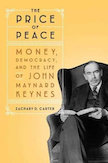
Author – By: Zachary D. Carter
A page-turning biography of world-changing economist John Maynard Keynes and the big ideas, inspired by his friendships with the Bloomsbury Group, that outlived him.
In the spring of 1934, Virginia Woolf sketched an affectionate “biographical fantasy” of her great friend John Maynard Keynes. Writing two years before the publication of his magnum opus, The General Theory, Woolf nevertheless found herself unable to condense her friend’s already-extraordinary life into anything less than twenty-five themes, which she jotted down at the opening of her portrait: “Politics. Art. Dancing. Letters. Economics. Youth. The Future. Glands. Genealogies. Atlantis. Mortality. Religion. Cambridge. Eton. The Drama. Society. Truth. Pigs. Sussex. The History of England. America. Optimism. Stammer. Old Books. Hume.”
Keynes was not only an economist, as he is remembered today, but the preeminent anti-authoritarian thinker of the twentieth century, a man who devoted his life to the belief that art and ideas could conquer war and deprivation. A moral philosopher, political theorist, and statesman, Keynes immersed himself in a creative milieu filled with ballerinas and literary icons as he developed his own innovative and at times radical thought, reinventing Enlightenment liberalism for the harrowing crises of his day–which included two world wars and an economic collapse that challenged the legitimacy of capitalism and democratic government itself. Keynes’s extraordinary life took him from intimate turn-of-the-century parties in London’s riotous Bloomsbury art scene to the fevered negotiations in Paris that shaped the Treaty of Versailles, through stock market crashes on two continents, diplomatic breakthroughs in the mountains of New Hampshire, and wartime ballet openings at Covent Garden.
In this riveting biography, veteran journalist Zachary D. Carter unearths the lost legacy of one of history’s greatest minds. John Maynard Keynes’s vibrant, deeply human vision of democracy, art, and the good life has been obscured by technical debates, but in The Price of Peace, Carter revives a forgotten set of ideas with the power to reinvent national government and reframe the principles of international diplomacy in our own time.
Industry Reviews
“Zachary D. Carter has given us an important, resonant, and memorable portrait of one of the chief architects of the world we’ve known, and know still. As Richard Nixon observed, we’re all Keynesians now–even if we don’t realize it. Carter’s powerful book will surely fix that.”–Jon Meacham, Pulitzer Prize-winning author of The Hope of Glory
“The Price of Peace is a towering achievement. Carter blends a nuanced and sophisticated financial history of the twentieth century with the intimate personal drama and political upheaval of an epic novel. . . . A masterful biography of a unique and complex social thinker.”–Stephanie Kelton, author of The Deficit Myth
“With an eye for the apt phrase and the telling detail, Zachary D. Carter has written a thoughtful and sweeping biography of Keynes and his ideas, extending through the twentieth century and into our own time. Carter gives life to the effortless brilliance, frank appetites, and ethical commitments that made Keynes and Keynesianism so immensely consequential in philosophy, art, money, politics, letters, and war. The Price of Peace is a terrific book about a fascinating character.”–Eric Rauchway, author of Winter War
“Making an impressive book debut, journalist Carter offers a sweeping, comprehensive biography of economist, political theorist, and statesman John Maynard Keynes (1883-1946), one of most influential figures of his time. . . . An absorbing, thoroughly researched life of a singular thinker.”—Kirkus Reviews (starred review)
“Although British economist [John Maynard] Keynes is mostly remembered for the theory that bears his name, in his first book, journalist [Zachary D.] Carter reveals that his ideas have far more to offer to today’s world of rickety economies and creeping authoritarianism. . . . In this sweeping intellectual biography, Carter traces Keynes’ career from his first forays into public policy during WWI, through the bumpy 1920s and the Great Depression, to its end in the behind-the-scenes negotiations of WWII. He vividly describes Keynes’ world, which encompassed both European realpolitik and the Bloomsbury Group, and illustrates how his academic, cultural, and political activities influenced his ideas. . . . Carter’s timely study is highly recommended.”—Booklist (starred review)